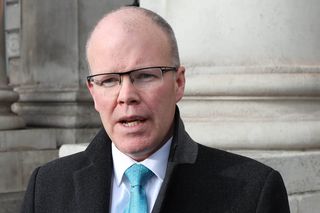Women, know thy pension: addressing the retirement pay gap
Things are slowly changing in the world of pensions, but there is a long way to go before women are catered for in the same way as men, writes Sinead Ryan

Let's say your boss hauled you in to give you the bad news: there's going to be a massive pay cut across the company - 35pc - but only for the women. The men can carry on as they were - even though you're all doing the same job.
Not only would there be a stampede of stilettos, but it would be illegal on several grounds.
Yet women earn that much less when they retire than men. Why?
Much is to do with the gender gap recently exposed by the Pensions Council, in a study undertaken by the ESRI. For historical reasons, women retired at an earlier age than male workers, were less likely to have 40-year careers and more likely to take time out of the workforce to raise families or care for elderly parents, or return to part-time, lower-paid work. Because they live longer than men, they spend longer in widowhood on reduced incomes. Taking care of future taxpayers helps society, but is detrimental to their future financial security.
It's true that women rely predominately on the State pension. According to the ESRI, "Men are more likely to receive income from self-employment and from individual private pension schemes, both types accounting for almost 14pc of their income, while it is less than 4pc for women."
Women are far more likely to be reliant on State 'old age' pension income.
"Our current pension policy is failing women," says Orla O'Connor, Director of Pensions at the National Women's Council of Ireland. "The Government's emphasis is focused on encouraging people to sign up to private pensions, which works best for those who have continuous, full-time employment and with a high salary."
But, says O'Connor, "They have no automatic entitlement to it. Only 41pc of women receive the full Contributory State Pension."
The Government argues there is no gender gap now in the provision of the State pension - and the ESRI report backs this up. However, for decades many women were mere appendages to their husbands' pensions and the shortfall is acute when it comes to private pension provision.
The rollout of Automatic Enrolment, due by 2021, will see anyone earning over €20,000 p.a. have deductions taken directly from their salary and ringfenced as a pension supplement - the Government says this will be in addition to the State pension - but the self-employed and those on part-time or lower incomes (overwhelmingly women) may not even be included.
However, things are changing, but in the glacially slow world of pensions, it may not be in time.
Data from Standard Life shows participation by women in pension ownership has gone up by 40pc in the last year, which is off a low base and as much to do with the improving economy as anything else. However, it reiterated that they continue to lag behind men on retirement saving - just 39pc own a pension (and many are public sector workers like nurses and teachers, where it is automatic) compared to 54pc of male workers.
Worse, the average man will retire on three times what most women will. "The average private sector woman has saved a retirement income equivalent of €2,400 p.a. while their male equivalent saves almost three times that, at €6,500 p.a. This excludes the State pension of up to €12,900 per annum," says the report.
Pension pot: Not understanding pensions and not being able to afford one are the top reasons given for the gender gap
Not being able to afford one, and not understanding pensions are the top reasons given for the gap. Being informed is the key, according to Standard Life’s Aileen Power.
“Once people understand how important it is to have their own pension and how beneficial the tax breaks are – they take action. We hope this is what this survey is telling us,” she said.
Pensions expert David Boylan of Davy stockbrokers says women are still more likely to take time out of work to look after children, and find themselves behind on a personal pension, come retirement. He says it's therefore even more important for women to start paying into a pension early. "If you are then out with children you will at least have a pot that will keep getting returns in the background. When you do go back to work you are not looking to start funding your retirement from scratch."
Pension Adjustment Orders
The first some women will hear about pensions is when they're the subject of a separation or divorce hearing.
Kirstie Flynn, pensions lawyer with Willis Towers Watson, explains: "A Pension Adjustment Order (PAO) is an order made by the Court as part of divorce or judicial separation proceedings. If one spouse is in an occupational pension scheme as part of their employment, then the Court can order that the trustees of the pension scheme pay part (or even all) of the pension to the other spouse, or for the benefit of a dependent child. A PAO can also be made over life assurance benefits payable under a pension scheme.
There is no typical order. Often the couple will agree to split the various benefits under the pension scheme in different proportions - e.g. the spouse might get 30pc of the retirement pension, but 80pc or 100pc of the benefits payable on the pension scheme member's death.
Pension benefits can be worth as much as, or sometimes more than, the value of the family home. So make sure you weigh the total up against the value of family assets and future income.
PINK YOUR PENSION
Aileen Power says a few simple steps will future proof your finances:
1. Talk to a family member/friend you trust on financial matters so you can ask all your basic questions and get comfortable with the topic.
2. At work, find out who is in charge of signing you up to a pension. Remember all employers, irrespective of size have to offer you access to a pension.
3. If your employer is offering a percentage of your annual salary as a contribution towards your pension pot – sign up as fast as you can. Otherwise you could be leaving thousands of euro per year for your employer to use as they wish instead of watching your pension pot grow.
Join the Irish Independent WhatsApp channel
Stay up to date with all the latest news















